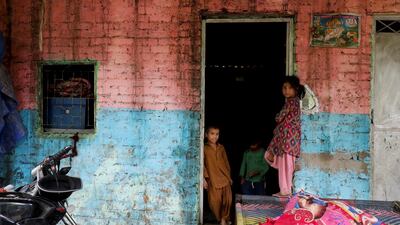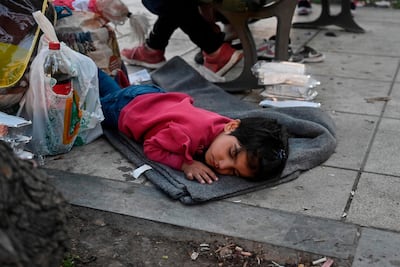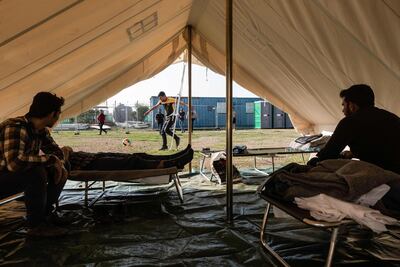Today, we observe World Refugee Day and honour the extraordinary strength and resilience of forcibly displaced women, men, and children.
This year has thus far been challenging for many of us, as the Covid-19 pandemic takes a toll on global health systems and the economy, as well as on our societies and individual lives. As always, the most vulnerable are also those most affected by these challenges, chief among them, refugees and displaced persons. Yet, many acts of resilience, solidarity, and a greater sense of individual and collective responsibility have shined through these successive crises.
The pandemic has revealed the shortcomings in our societies, as have recent protests against racism and police brutality. We must fight for a more inclusive world where equality reigns and no one is left behind. We all have a role to play in enacting change. This idea is at the heart of World Refugee Day this year, when we remind ourselves that every action counts in an effort to create a more just and inclusive world.
UNHCR's recently published Annual Global Trends report shows that forced displacement now affects more than one percent of humanity, with less and less people able to return home every year. The number of forcibly displaced people hit a new record of 79.5 million in 2019, a result of new displacement, particularly in the Democratic Republic of the Congo, the Sahel, Venezuela, Yemen and Syria. Forced displacement has almost doubled since 2010, with more than 75 per cent of world refugees caught up in long-term displacement and unable neither to return home nor to build a new future in their host country.
Yemen, home to the world's largest humanitarian crisis, now faces the coronavirus pandemic and natural catastrophes. As the conflict enters its sixth year, it is estimated that more than 3.6 million people have been forced to flee their homes in Yemen, with more than 80 per cent of the population requiring humanitarian assistance. Nearly four million IDPs, returnees, refugees and asylum-seekers rely on regular humanitarian aid. Syria, meanwhile, accounts on its own for 13.2 million refugees, internally displaced people, and asylum seekers in the 10th year of the conflict.
In the Sahel region, escalating violence targeting civilians includes summary execution, the widespread use of rape as a weapon of war against women, in addition to attacks against state institutions, schools and health facilities. This situation has turned three million people into refugees, IDPs, returnees and people at risk of statelessness. Local communities have been extremely generous and supportive, but humanitarian needs exceed their capacities.
Armed conflict that sparked in 2011 in northern Mali has now spread to central Mali, Niger, and Burkina Faso with indirect effects in neighbouring countries such as Chad and Mauritania. In Burkina Faso, the number of people internally displaced has more than quadrupled from 193,000 in June 2019 to 848,000 at the end of April. During this challenging time, UNHCR is providing shelter assistance, core relief items and protection services, while following an eco-friendly approach to prevent climate-related displacement.
The 2030 Sustainable Development commitment of “leaving no one behind” now also explicitly includes refugees, thanks to a new indicator.
Although refugees are vulnerable and often disadvantaged, they have managed to shine when generous societies and enlightened governments give them the chance to be accepted. On this World Refugee Day, let us renew our personal and collective commitment to give every refugee, displaced and stateless person, an opportunity to contribute to the common good, and make a difference in their lives.
Nadia Jbour is the head of the UNHCR office in the UAE
Dubai Bling season three
Cast: Loujain Adada, Zeina Khoury, Farhana Bodi, Ebraheem Al Samadi, Mona Kattan, and couples Safa & Fahad Siddiqui and DJ Bliss & Danya Mohammed
Rating: 1/5
10 tips for entry-level job seekers
- Have an up-to-date, professional LinkedIn profile. If you don’t have a LinkedIn account, set one up today. Avoid poor-quality profile pictures with distracting backgrounds. Include a professional summary and begin to grow your network.
- Keep track of the job trends in your sector through the news. Apply for job alerts at your dream organisations and the types of jobs you want – LinkedIn uses AI to share similar relevant jobs based on your selections.
- Double check that you’ve highlighted relevant skills on your resume and LinkedIn profile.
- For most entry-level jobs, your resume will first be filtered by an applicant tracking system for keywords. Look closely at the description of the job you are applying for and mirror the language as much as possible (while being honest and accurate about your skills and experience).
- Keep your CV professional and in a simple format – make sure you tailor your cover letter and application to the company and role.
- Go online and look for details on job specifications for your target position. Make a list of skills required and set yourself some learning goals to tick off all the necessary skills one by one.
- Don’t be afraid to reach outside your immediate friends and family to other acquaintances and let them know you are looking for new opportunities.
- Make sure you’ve set your LinkedIn profile to signal that you are “open to opportunities”. Also be sure to use LinkedIn to search for people who are still actively hiring by searching for those that have the headline “I’m hiring” or “We’re hiring” in their profile.
- Prepare for online interviews using mock interview tools. Even before landing interviews, it can be useful to start practising.
- Be professional and patient. Always be professional with whoever you are interacting with throughout your search process, this will be remembered. You need to be patient, dedicated and not give up on your search. Candidates need to make sure they are following up appropriately for roles they have applied.
Arda Atalay, head of Mena private sector at LinkedIn Talent Solutions, Rudy Bier, managing partner of Kinetic Business Solutions and Ben Kinerman Daltrey, co-founder of KinFitz
THE BIO
Born: Mukalla, Yemen, 1979
Education: UAE University, Al Ain
Family: Married with two daughters: Asayel, 7, and Sara, 6
Favourite piece of music: Horse Dance by Naseer Shamma
Favourite book: Science and geology
Favourite place to travel to: Washington DC
Best advice you’ve ever been given: If you have a dream, you have to believe it, then you will see it.
UAE currency: the story behind the money in your pockets
White hydrogen: Naturally occurring hydrogen
Chromite: Hard, metallic mineral containing iron oxide and chromium oxide
Ultramafic rocks: Dark-coloured rocks rich in magnesium or iron with very low silica content
Ophiolite: A section of the earth’s crust, which is oceanic in nature that has since been uplifted and exposed on land
Olivine: A commonly occurring magnesium iron silicate mineral that derives its name for its olive-green yellow-green colour
Islamophobia definition
A widely accepted definition was made by the All Party Parliamentary Group on British Muslims in 2019: “Islamophobia is rooted in racism and is a type of racism that targets expressions of Muslimness or perceived Muslimness.” It further defines it as “inciting hatred or violence against Muslims”.
The burning issue
The internal combustion engine is facing a watershed moment – major manufacturer Volvo is to stop producing petroleum-powered vehicles by 2021 and countries in Europe, including the UK, have vowed to ban their sale before 2040. The National takes a look at the story of one of the most successful technologies of the last 100 years and how it has impacted life in the UAE.
Read part four: an affection for classic cars lives on
Read part three: the age of the electric vehicle begins
Read part one: how cars came to the UAE
UAE currency: the story behind the money in your pockets
More from Rashmee Roshan Lall
The specs
Engine: 2.0-litre 4-cylinder turbo
Power: 258hp from 5,000-6,500rpm
Torque: 400Nm from 1,550-4,000rpm
Transmission: Eight-speed auto
Fuel consumption: 6.1L/100km
Price: from Dh362,500
On sale: now
ASIAN%20RUGBY%20CHAMPIONSHIP%202024
%3Cp%3E%3Cstrong%3EResults%3C%2Fstrong%3E%3Cbr%3EHong%20Kong%2052-5%20UAE%3Cbr%3ESouth%20Korea%2055-5%20Malaysia%3Cbr%3EMalaysia%206-70%20Hong%20Kong%3Cbr%3EUAE%2036-32%20South%20Korea%3Cbr%3E%3Cbr%3E%3Cstrong%3EFixtures%3C%2Fstrong%3E%3Cbr%3EFriday%2C%20June%2021%2C%207.30pm%20kick-off%3A%20UAE%20v%20Malaysia%3Cbr%3EAt%20The%20Sevens%2C%20Dubai%20(admission%20is%20free).%3Cbr%3ESaturday%3A%20Hong%20Kong%20v%20South%20Korea%3Cbr%3E%3C%2Fp%3E%0A
Israel Palestine on Swedish TV 1958-1989
Director: Goran Hugo Olsson
Rating: 5/5
COMPANY%20PROFILE
%3Cp%3E%3Cstrong%3EName%3A%3C%2Fstrong%3E%20PlanRadar%3Cbr%3E%3Cstrong%3EStarted%3A%20%3C%2Fstrong%3E2013%3Cbr%3E%3Cstrong%3ECo-founders%3A%20%3C%2Fstrong%3EIbrahim%20Imam%2C%20Sander%20van%20de%20Rijdt%2C%20Constantin%20K%C3%B6ck%2C%20Clemens%20Hammerl%2C%20Domagoj%20Dolinsek%3Cbr%3E%3Cstrong%3EBased%3A%20%3C%2Fstrong%3EVienna%2C%20Austria%3Cbr%3E%3Cstrong%3ESector%3A%20%3C%2Fstrong%3EConstruction%20and%20real%20estate%3Cbr%3E%3Cstrong%3ECurrent%20number%20of%20staff%3A%20%3C%2Fstrong%3E400%2B%3Cbr%3E%3Cstrong%3EInvestment%20stage%3A%20%3C%2Fstrong%3ESeries%20B%3Cbr%3E%3Cstrong%3EInvestors%3A%3C%2Fstrong%3E%20Headline%2C%20Berliner%20Volksbank%20Ventures%2C%20aws%20Gr%C3%BCnderfonds%2C%20Cavalry%20Ventures%2C%20Proptech1%2C%20Russmedia%2C%20GR%20Capital%3C%2Fp%3E%0A
Cinco in numbers
Dh3.7 million
The estimated cost of Victoria Swarovski’s gem-encrusted Michael Cinco wedding gown
46
The number, in kilograms, that Swarovski’s wedding gown weighed.
1,000
The hours it took to create Cinco’s vermillion petal gown, as seen in his atelier [note, is the one he’s playing with in the corner of a room]
50
How many looks Cinco has created in a new collection to celebrate Ballet Philippines’ 50th birthday
3,000
The hours needed to create the butterfly gown worn by Aishwarya Rai to the 2018 Cannes Film Festival.
1.1 million
The number of followers that Michael Cinco’s Instagram account has garnered.
Profile
Name: Carzaty
Founders: Marwan Chaar and Hassan Jaffar
Launched: 2017
Employees: 22
Based: Dubai and Muscat
Sector: Automobile retail
Funding to date: $5.5 million
Killing of Qassem Suleimani
Sly%20Cooper%20and%20the%20Thievius%20Raccoonus
%3Cp%3E%3Cstrong%3EDeveloper%3A%3C%2Fstrong%3E%20Sucker%20Punch%20Productions%3Cbr%3E%3Cstrong%3EPublisher%3A%3C%2Fstrong%3E%20Sony%20Computer%20Entertainment%3Cbr%3E%3Cstrong%3EConsole%3A%3C%2Fstrong%3E%20PlayStation%202%20to%205%3Cbr%3E%3Cstrong%3ERating%3A%3C%2Fstrong%3E%205%2F5%3C%2Fp%3E%0A



